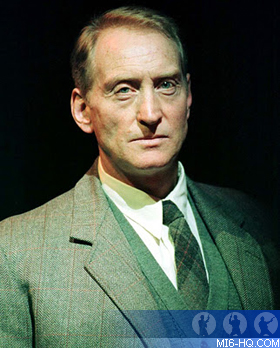Filming Fleming
29th January 2013
As the new mini-series goes into production, guest writer Neil McNally investigates the history of Ian Fleming, as depicted by dramas and biopics
 By MI6 Staff
By MI6 Staff
Naval commander, stockbroker, journalist, author, and bon vivant are just some of the words that can be used to describe Ian Fleming. With his birth on May 28, 1908, the world was certainly introduced to a unique individual whose total life experiences, it could be argued, were leading up to the creation of master spy James Bond. But, who really was Ian Fleming? Since the 007 phenomenon began sixty years ago it has been fashionable for critics and fans alike to proclaim that Fleming was James Bond and James Bond was Ian Fleming. However, the threads of Fleming's real life are layered and complex and this assessment has since been proven to be not so cut and dried.
What was real and what has since been embellished? Since his death on August 12, 1964, three movies Goldeneye, Spymaker, and Age of Heroes have attempted to answer these questions by focusing on different aspects and times within his life. While these films may be of mixed quality and merit, together they show how Fleming's all-too-short life and work can be ably juxtaposed with the timeless character he created.
Goldeneye (1989) Not only does Dance eerily look like Fleming, but he assumes his mannerisms, habits, and dress in such a way that it lends the film an initial firm credibility. As the title suggests, Fleming's Jamaican home "Goldeneye" is another character unto itself. It is Fleming's tropical sanctuary from the real world, and a place where he feels the most comfortable. Appropriately, the film begins here with Fleming being interviewed by a news crew where he wistfully flashbacks to his days working for the British government. |
|
At this moment the film diverges into two distinct halves and takes on a dual subtext: Fleming's life through love and war. This approach gives the film a distinct edge on its later competitors. Through his exploits in WWII, womanising, espionage, intrigue, and more womanising, we are given a large glimpse into Fleming's complicated relationship with his girlfriend and future wife Anne Charteris. For those unaware, Fleming and Charteris's relationship was anything but "normal." Their world was one where Charteris was married, and not only having an affair with publishing magnate Lord Rothermere, but Fleming as well.
|
Using that relationship as its primary springboard, "Goldeneye" does an admirable job presenting the facts of Fleming's life accurately, yet not in their chronological order. We see his failed early training as an agent, his covert work with Admiral Godfrey (more on him later), his tenderness and eventual marriage to Anne, and the creation of a certain spy. If that weren't enough, even Noel Coward makes an appearance! Left: Fleming's Jamaican home, GoldenEye. |
Aside from forgivable embellishments, the only real glaring factual error is when Fleming and a superior visit the American mobster "Lucky" Luciano in a New York prison. The two need "assistance" in sinking a German submarine to obtain a top secret German codebook held within it. Luciano readily agrees to help them through his various underworld contacts. All he requests in return is a vacation from prison after the war. It goes without saying that this event never happened, and is a creation of the screenwriter. The only link that Ian Fleming had to Luciano was interviewing him for his 1963 book "Thrilling Cities." If the subject of a sunken submarine came up it must have slipped Fleming's mind.
Ultimately, some biopics shy away from the more negative aspects of their subject's life. "Goldeneye" does the opposite and embraces them... warts and all. Charles Dance's performance shows us a Fleming that is many things to many people: cold, charming, witty, romantic, and, most of all, human. We are given the closest approximation of Ian Fleming that is possible, and for that reason the film compels you to keep watching.
Spymaker (1990) When World War II hits, we are introduced to Admiral John Godfrey, British Naval Intelligence Director and the eventual inspiration for M. As his personal assistant, Fleming acted not only as a departmental government liaison, but was an integral part in the organizing and planning of top secret missions abroad. It is these scenes, and his relationship with Godfrey, that rather effectively show the viewer Fleming's growing place of power within the British military. It is also with the introduction of Godfrey that the story veers from artistic embellishment into fiction. The filmmakers, in an effort to heighten the Fleming/Bond connection, throw in characters like a gadget man suspiciously named "Quincy," a Blofeld-esqe Nazi general hell bent on revenge, and frequent orders of a certain Vodka Martini "Shaken not Stirred." |
|
However, the most egregious error is Fleming leading a successful commando assault on a remote Nazi fortress during the finale. The reality was that, to his own dismay, Fleming never saw direct combat. Godfrey felt he simply knew too much, and would be detrimental to the war effort should he have fallen into enemy hands.
The tragic ending of "On Her Majesty's Secret Service" hangs heavy with a female love interest for Fleming named Leda St. Gabriel. Gabriel, played by Kristin Scott Thomas ("The English Patient"), is a hard-nosed fellow spy whose rough exterior is quickly worn down by Fleming's charm and ingenuity. Over the course of the movie, the two form a deep love for each other which ends tragically when she dies in a Nazi bomb explosion meant for Fleming.
In real life, the character of St. Gabriel is most likely based on Muriel Wright; an ex-girlfriend of Fleming's who died in a London air raid in 1944. While the two had been very close, they drifted apart due to Fleming's frequent womanising. Allegedly, when word reached him of the tragedy Fleming was racked with guilt for the rest of his life. It's hard not to see the parallels between the deaths of Muriel Wright and 007's doomed bride, Teresa.
In the end, the film gives a Fleming novice a rough outline of the man and his life. But, be warned that many events within the movie should be taken with a grain of salt. What the movie lacks in accuracy, Jason Connery makes up for with the bravado and confidence that were often attributed to the author.
Age of Heroes (2011)
The newest entry in the Fleming biopic canon focuses on his time as the creator and organizer of the famed World War II No. 30 Commando unit. An element that "Spymaker" hinted at, but never named directly. No. 30 was composed of intelligence personnel whose primary goal was to accompany troops on raids to find and gather intelligence. Under his command, they achieved many victories for the British war effort, and it was Fleming's creativity and imagination that made these successes possible. With this kind of importance in mind, it is surprising that his screen time within the film is relatively short and limited to a handful of command scenes. While actor James D'Arcy ("Master and Commander", "Cloud Atlas") portrays the youthful Fleming in a stern, but sympathetic fashion, it is the commandoes that are the driving force behind the story.
|
The leader Jones, played by actor Sean Bean ("GoldenEye" (1995), "Lord of the Rings: The Fellowship of the Ring", "Game of Thrones"), regretfully must leave his pregnant wife behind when Fleming requests his services in the formation of the unit. His mission is to lead an assault on a German radar facility in Norway, and steal secret German communications technology. The rag tag group of men he assembles are hardened but, worthy of the challenge ahead of them. Overall, the film is a fictionalized account of the differing personalities and individual stories of the men that serve in the unit. Rather than focusing on the whole story of No. 30, this film chooses to tell the story of one assault. In actuality, the unit had a very successful run of five years from 1941-1946. Their exploits are many and some are still classified. However, their missions included time in North Africa, the Greek Islands, Norway, Sicily, Italy, and Corsica. They went ashore on D-Day, helped to liberate Paris, pursued the elusive Enigma Decoder, and even seized the archives of the German navy. |
At the time of its release much was made of the Fleming/Bond connection that was supposedly in it. But, as stated before Fleming infrequently appears in it. His backstory, his history, and even his association with Admiral Godfrey are suspiciously left out. A more detailed account of his involvement in the unit, and the true life men themselves, might even have led to wider distribution and exposure for the film.
Epilogue: The Future of Fleming Right: Dominic Cooper will play Ian Fleming in the new mini-series. |
|
Thanks to Neil McNally.











